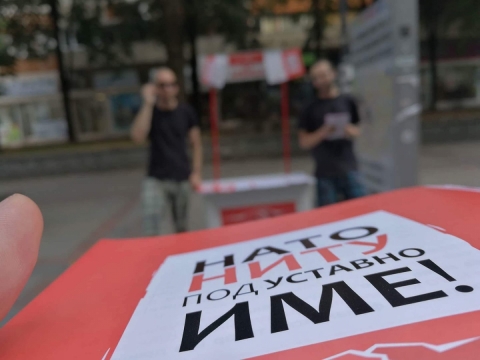Common struggle of peoples against capital, NATO, NATO, EU and nationalism

Joint statement NAR for the Communist Liberation - Социјалистичка зора/Socijalisticka Zora/Agimi Socialist
There are no real "solutions" to Agreements imposed by imperialist organizations.
Common struggle of peoples against capital, NATO, NATO, EU and nationalism
Chauvinist rhetoric is once again erupting in both Greece and North Macedonia. Except for some nationalist cries without real value, there is as yet nothing to suggest that either the newly-elected President or the incoming government will not respect the Prespa Agreement, an agreement sponsored by NATO and the EU to “resolve” the long-running “name-dispute” between the two countries. Besides, Greece has yet to fulfil its own side of the agreement with three protocols that are part of the Prespa Agreement not yet adopted in its parliament. The successive demands imposed on North Macedonia by NATO-EU-Greece and Bulgaria over the past years are humiliating to the Macedonian people, its identity and language. Imperialism and the institutional racism of all the Balkan governments feeds the hatred of fascists and nationalists.The people of the Balkans have experienced all the catastrophes that capitalism brings to their region. They are victims of wars and interventions organized by the imperialist powers in order to impose their dominance. There are no real “solutions” on Agreements sponsored by imperialist organizations. The Prespa Agreement was never a blow to nationalism as it was presented. On the contrary, it was on the service of the imperialist priorities in the area, while it overlooked the nationalist dynamic that the narrative of the “national betrayal” created.
Although the Prespa Agreement is discussed again, the public debate is only about the “name” issue, while the NATO-led war campaigns, the EU “war economy” are out of the question. NATO is the most dangerous war-machine in the world, while the EU is promoting austerity, flexible labour conditions, privatizations for its member states. Greek capital (with the defining role of the EU-US multi-national corporations) has a dominant role in North Macedonia. Energy, banking, retail are sectors in North Macedonia controlled to a certain extent by the Greek capital, with a heavy antagonism to the Turkish capital in the region. That is why Greek capitalism and governments are aggressive, having the goal to “regain part of its leading role and influence in the Balkans while limiting, over time, Turkey’s influence in the area”. In overall, the Greek state’s desire is to be the main NATO and EU agent in the Balkans and through this role to improve the position of its ruling class and the Greek capital. The Prespa Agreement is aligned with the priorities of US and EU imperialism to oust Russia, China and Turkey from the Western Balkans. The Greek state managed, with minor concessions, to sign a beneficial agreement that allows it to exert new political influence in the region, using nationalism as a tool of pressure in order to make less concessions and obtain more. At the same time the official narrative conveyed to Greek people through mass media and the ruling parties was that North Macedonia posed a threat to Greek territory with its irredentism.
The issue of the national identity was never the cause of competitions and wars. The reasons lie in the conflict of class interests. The Macedonian ethnogenesis was connected with the social issue already from the time of Iliden Uprising in 1903 but as well as in the ‘20s, ‘30s, and ‘40s where it clashed with the fascist regimes in Serbia but in Greece and Bulgaria also. Currently there is an ongoing effort in all the Balkan countries to include all this in nationalist narratives without the social and class dimension in an overall effort to revise history that takes place in a world scale as well, for example with the equation of fascism with communism. In Greece the “Macedonian Issue” reaches the core of the national narrative of the new Greek state. By concealing the multi-national composition of the Macedonia area and the nationalist policies of repression that the Greek state over time systematically imposed on the Slavic elements within the Greek borders. Historically the communist movement in Greece opposed this national, bourgeois policy. The current view that doesn’t recognize a modern Macedonian nation and language is tragic if we consider the thousands of communists in Greece that were tortured, executed, or exiled in remote islands exactly because they refused the policy of the official Greek state in the ‘40s, ‘50s and ‘60s. The common anti-fascist struggle of Greek and Macedonian people during the Nazi Occupation, the common Resistance movement is an example that people in the Balkans -having a common culture and history- are able to unite against the monsters of nationalism and imperialism.
Today, a common front against the multi-national capital, the EU and NATO is required. Against both the two main forms of the bourgeois policy – the bourgeois nationalism and the bourgeois cosmopolitanism that serves imperialism. For an anti-imperialist, class and internationalist unity of the peoples. The internationalist working-class intervention is necessary for the co-operation of the working classes and the peoples against all of the bourgeois classes, imperialism and every nationalism from both sides of the borders. This is the only way to ensure the independence of the class forces from the bourgeois policy, to lay the foundations of forming a new alternative for the Balkans and to accommodate a common anti-imperialist, anti-nationalist, anti-war struggle.
- NAR for the Communist Liberation - Greece
- Социјалистичка зора/Socijalisticka Zora/Agimi Socialist - North Macedonia
June 2024



















































